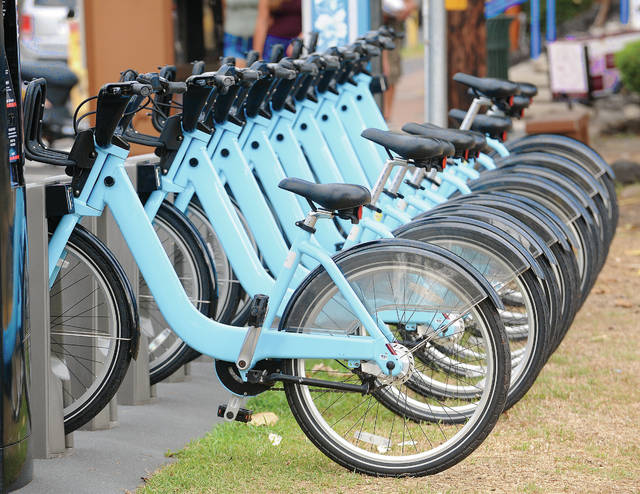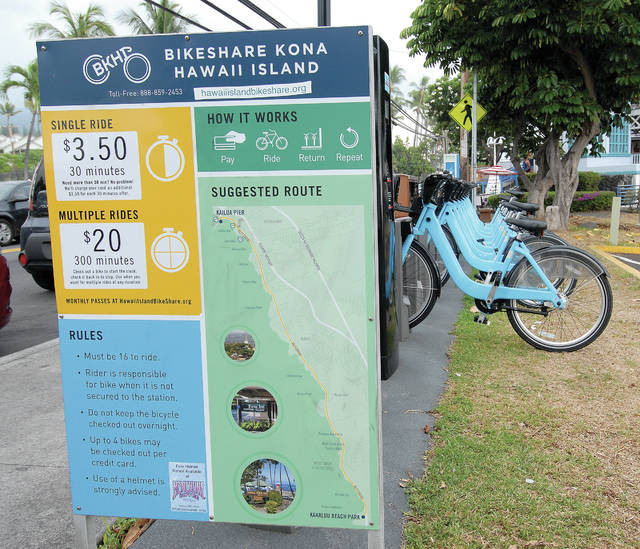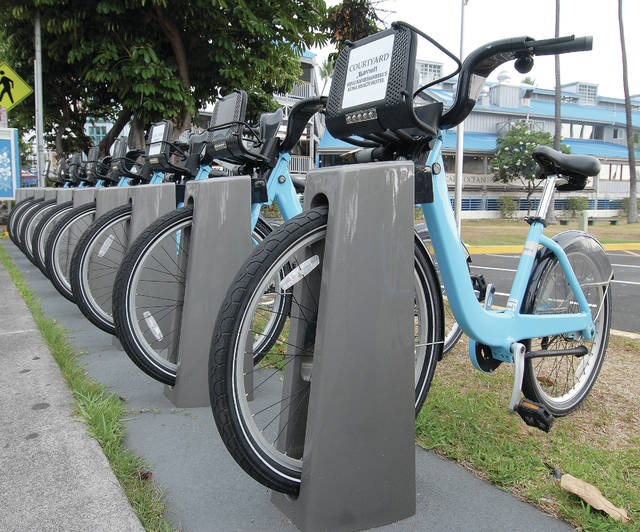KAILUA-KONA — One year after its inception, Kona’s bikeshare program is rolling right along. ADVERTISING KAILUA-KONA — One year after its inception, Kona’s bikeshare program is rolling right along. People’s Advocacy for Trails Hawaii, or PATH, instituted the program after
KAILUA-KONA — One year after its inception, Kona’s bikeshare program is rolling right along.
People’s Advocacy for Trails Hawaii, or PATH, instituted the program after signing a $250,000 contract with Hawaii County, which was recently extended for 180 days.
PATH Executive Director Tina Clothier, said the move was made simply to allow the organization to obtain written approval to maintain bike stations on county property long-term and secure all its special management area exemptions.
There are no cost extensions and the county isn’t going to spend any more money on the program, at least not for now. Instead, Kona’s bikeshare program is riding out on its own, so to speak.
“We probably won’t be seeking a new contract with the county,” Clothier said. “The expansion of the program right now is pretty much on PATH to seek out funds by writing grant requests and developing sponsorships for more stations.”
PATH will submit a grant-in-aid request to the Hawaii State Legislature next session and will also likely seek out funds from the Transportation Alternative Program — federal funds that come through the state.
In the meantime, Clothier said PATH expects to hear back late this year on a few other grants it’s already submitted elsewhere. The soonest any expansion might come early next year.
PATH’s expansion goals for the bikeshare program are, for the time being, limited to the Kailua Village area. Clothier said 10 stations along Alii Drive, through the village and up to Kona Commons would be ideal.
“That will be proof of the viability of the bikeshare program in Kailua-Kona,” she said. “From there, we hope we can replicate that in other communities.”
Expansion to other communities likely would again involve the county, Clothier said, and PATH is currently feeling out the new administration under Mayor Harry Kim to get his thoughts on spreading bikesharing across the island.
Clothier added the first target for a sister program would be Hilo, which she explained is adding more bicycle infrastructure like bike lanes.
Bikeshare would fit perfectly with Hilo’s downtown mobility plan, she explained, and implementation of that plan would likely dictate the timing of attempts to bring the program to East Hawaii.
For now, Clothier believes bikeshare usage numbers in Kona justify spreading the program out. PATH projected about 3,000 users in it’s first year and outperformed those projections by about 20 percent.
“It’s exactly what we expected,” she said. “Most of our usage has been from visitors, but we do have some residents who have signed up as members.”
PATH hopes to extend community membership, which ranges from $15-$25 monthly for unlimited rides of 30-60 minutes, respectively. The organization will attempt to do so, in part, through partnerships.
West Hawaii Community Health Center and Island Heart Care plan to utilize bikeshare in their diabetes prevention programs and other health initiatives. Membership for participants would be free initially, then offered at a reduced price for the rest of the year.
“This is a community asset and it’s not just for the visitors,” Clothier said.
The bikes themselves, stored outdoors in public places, have been well maintained. Clothier said there have been no theft attempts and only two bikes have sustained minor damage.
There was some minimal tagging of stations in the beginning, Clothier said, but it has not proven to be a continuous concern.





